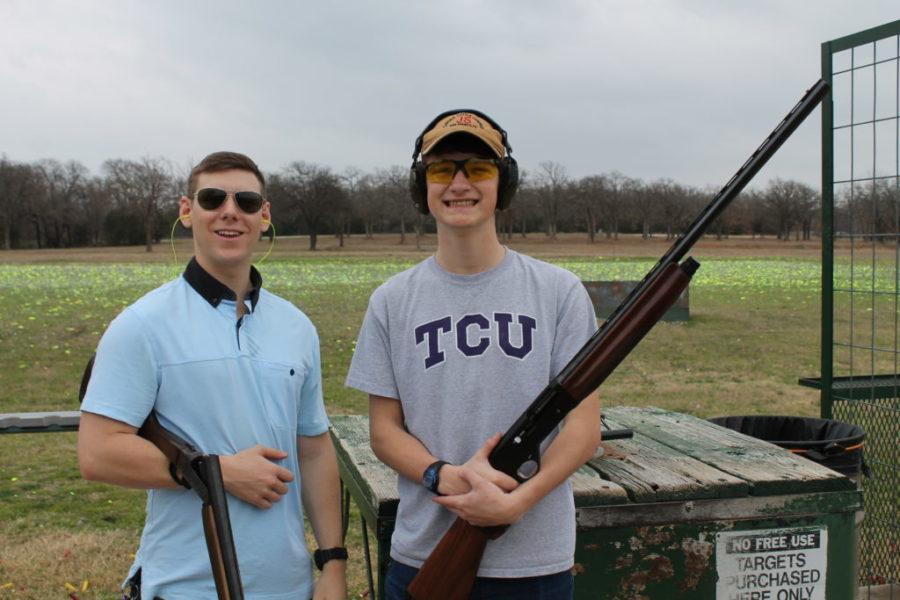Growing up, Martin De Rito’s family was not a gun-loving group. He said his dad was “anti-gun” and his mom didn’t want any guns in the house– but that didn’t stop De Rito. He first went shooting around age six, but De Rito said he wasn’t able to shoot regularly until his junior year of high school. This was around the time he was able to buy his first gun, an AR-15, a modern sporting rifle. The junior economics major says he enjoys going shooting because of the inclusive nature of it. “Everyone can come together and it’s good competition,” De Rito said. “Never a bad day at the range.” It’s the social aspect that he enjoys most, often going shooting with his friends to the Alpine Shooting Range in Fort Worth. “My friend group – it’s very gun friendly, very safe, very responsible gun owners,” he said. One of those friends is sophomore entrepreneurial management major Frank Cargile, the president of TCU’s Trap and Skeet club. Cargile grew up hunting and shooting with his dad back home but changed to targets after arriving at TCU. “I grew up hunting dove and deer and then once I came to college I just really got into shooting clays,” he said. “I find it really enjoyable.” Both men agreed that while shooting is fun, it’s also paramount to have the proper safety and training before handling a firearm. “If you’re shooting and you don’t know what you’re doing with a gun, it can be disastrous,” Cargile said. “If I’m shooting with people, I explain: This is what we need to do, this is what we don’t need to do, especially if they are a first time shooter.” De Rito said that while it’s important to be safe and responsible around guns, they aren’t as scary as many people think. “You take people shooting and they shoot my AR-15 and they think it’s going to be this big rifle and really the scariest thing is that it’s loud,” he said. Cargile agreed. “It’s absolutely nothing to be afraid of,” he said. “It’s nothing like the movies show it to be. It’s a whole lot of fun; that’s all it is.” Misconceptions like these are part of the reason De Rito said he thinks campus carry was voted down in 2015. “Most people would vote no just because it doesn’t affect them,” he said. “I was disappointed but I wasn’t surprised.” The decision for TCU to opt out of campus carry, also know as Senate Bill 11, came over a series of months including polls, student debates and open forums, as well as votes from the Student Government Association, Faculty Senate and Staff Assembly. The Board of Trustees officially voted to opt out of campus carry on Nov. 13, 2015. Cargile said that even though he saw the decision coming, he was still disappointed. “The guys that are carrying concealed, the guys who have their concealed carry licenses, those aren’t the guys you really need to worry about,” he said. “They are the responsible gun owners. They are out there to make a difference rather than hurt people.” This desire to make a difference is part of the reason De Rito said he was in the process of getting his concealed carry permit. “I just think it’s the responsible thing to do,” he said. “I take responsibility for my own liberties, my own self and the people around me; I feel responsible for that. I have a fire extinguisher at home; I hope to never use it, but it’s there.” TCU chief of police Steven McGee said he also sees this sense of responsibility from concealed carry permit holders. “We’ve found that most concealed carry holders across the state, they get the permit for self-protection,” he said. “They aren’t going to advertise. They don’t want to draw attention to themselves.” That’s part of the reason McGee said it’s so important for TCU students to call them if they do see someone walking around campus or near campus with a weapon – even if the student just thinks the person is exercising their open carry rights. “Call us immediately,” McGee said. “It’s really important for us to go out and see what this individual is doing and make sure they are just passing through. We’d rather check it out and find there is nothing going on than have harm come to one of our students.”
Categories:
Post opting out of campus carry, TCU students maintain gun culture
Published Mar 26, 2017
Junior Martin De Rito and sophomore Frank Cargile enjoy a day on the range. (Photo by Elizabeth Campbell)




